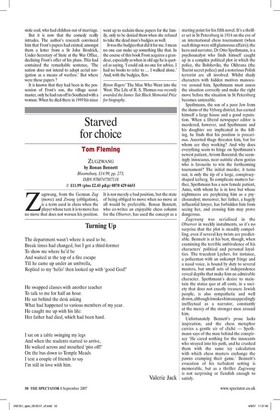Starved for choice
Tom Fleming ZUGZWANG by Ronan Bennett Bloomsbury, £14.99, pp. 273, ISBN 9780747587118 © £11.99 (plus £2.45 p&p) 0870 429 6655 4 ugzwang, from the German Zug (move) and Zwang (obligation), is a term used in chess when the player whose turn it is to move has no move that does not worsen his position.
It is not merely a bad position, but the state of being obliged to move when no move at all would be preferable. Ronan Bennett, who co-writes an enjoyable chess column for the Observer, has used the concept as a starting point for his fifth novel. It's a thriller set in St Petersburg in 1914 on the eve of an international chess tournament (when such things were still glamorous affairs); the hero and narrator, Dr Otto Spethmann, is a psychoanalyst who finds himself caught up in a complex political plot in which the police, the Bolsheviks, the Okhrana (the Tsarist secret police) and a notorious Polish terrorist are all involved. Whilst shady characters with hidden motives manoeuvre around him, Spethmann must assess the situation correctly and make the right move before the situation in St Petersburg becomes untenable.
Spethmann, the son of a poor Jew from the slums of the Vyborg district, has earned himself a large house and a good reputation. When a liberal newspaper editor is murdered, however, and Spethmann and his daughter are implicated in the killing, he finds that his position is precarious. Assorted thugs threaten him, but for whom are they working? And why does everything seem to hinge on Spethmann's newest patient, Avrom Rozental, the seemingly innocuous, near-autistic chess genius who is favourite to win the forthcoming tournament? The initial murder, it turns out, is only the tip of a large, conspiracyshaped iceberg. To complicate matters further, Spethmann has a new female patient, Anna, with whom he is in love but whose nightmares are perplexing him as a psychoanalyst; moreover, her father, a hugely influential lawyer, has forbidden him from seeing her, and crossing him may prove dangerous.
Zugzwang was serialised in the Observer in weekly instalments, so it's no surprise that the plot is steadily compelling, even if several key twists are predictable. Bennett is at his best, though, when examining the terrible ambivalence of his characters' political and personal loyalties. The truculent Lychev, for instance, a policeman with an unkempt fringe and a nasal voice, is bound by duty to several masters, but small acts of independence reveal depths that make him an admirable character. Spethmann's desire to maintain the status quo at all costs, in a society that does not exactly treasure Jewish people, is also sympathetic and well drawn, although it m akes him unappealingly ineffectual as a narrator, constantly at the mercy of the stronger men around him.
Unfortunately Bennett's prose lacks inspiration, and the chess metaphor carries a gentle air of cliché — Spethmann says of the man behind the conspiracy 'He cared nothing for the innocents who strayed into his path, and he crushed them with the same icy calculation with which chess masters exchange the pawns cramping their game.' Bennett's evocation of his turbulent setting is memorable, but as a thriller Zugzwang is not surprising or fiendish enough to satisfy.



































































 Previous page
Previous page